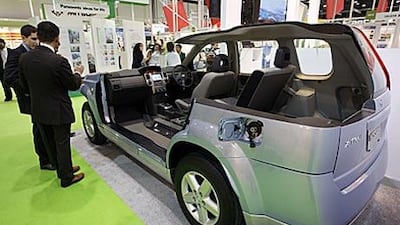Nissan's electric vehicle, the Leaf, will be on the market in the Middle East by 2012, according to Pierre Loing, vice president of product planning for Nissan. He spoke at the World Future Energy Summit on a panel with F. Emil Jacobs, vice president of research and development for Exxon Mobil Engineering and Neville Jackson, the technical director for Ricardo, an environmental research and development consultancy.
"By the end of 2010, it will be on sale in the US, Europe and Japan at the same time and then it will be rolled out globally in 2011 and 2012," says Loing of the Leaf. He says Nissan is serious about making mass market zero-emissions cars, and the company's plans are ambitious. "We will be the first, hopefully, global mass market maker of electric vehicles. It is difficult to forecast accurately but we estimate globally that 10 per cent of the world market will be electric vehicles by 2020.
"That is six million cars globally," he adds. "Every week a consultant tries to sell me tools to be able to forecast [future sales of electric vehicles] but we hope 10 per cent is accurate." But Loing says Nissan has plans for more eco-friendly cars aside from electric vehicles. "We are spending significant money on zero-emissions cars, but it is extremely risky to bet on just one form of technology.
"Diesel cars, which are very popular in Europe, have improved enormously as have petrol engines and there will be new hybrids on sale - in the US there'll be an Altima hybrid and the hybrid Infiniti will be launched in 2010 globally," says Loing. Marketing ecologically friendly cars to the GCC is a challenge, Loing admits, but is hopeful that performance-oriented low- and zero-emissions vehicles will find a market in the region.
"Hybrid and electric vehicles offer other benefits - higher acceleration capabilities than a traditional engine. The electric motor delivers torque straight from zero so they can be very entertaining to drive," he says. In countries where fuel prices are high, Loing says the cost benefits of electric cars are already becoming clear to consumers. "You spend a lot of money putting petrol in the car but an electric car might add maybe ?10 (Dh52) to your monthly power bill. That's nothing compared to what people are spending on petrol."
Loing also cites the success of the Nissan Qashqai crossover SUV in the Middle East as well as Europe as a hopeful sign for cars that combine performance, luxury and green credentials, with the petrol-engine version producing carbon emissions of just 129g per km. Echoing the sentiments of Sean Long, from the One North East regional development agency in England (see mo4), Loing believes that government and industry need to work closely when it comes to introducing the required infrastructure for electric vehicles.
"The Leaf has a recharge range of 160km, which is fine for most people's daily commute," he says. "It can be recharged overnight at home but quick charge stations, where you can charge up to 80 per cent of the battery in less than 30 minutes, are needed too. Docking stations need to be part of the infrastructure and we are actively engaging with governments and cities worldwide. We will talk to whoever is interested," says Loing of forming partnerships to ensure there are enough docking stations for electric vehicles to be a mass market success.
At the forum, Loing was the most optimistic of the speakers about the future market for electric vehicles, with forum chair, David Hart from E4Tech consultancy, describing Nissan's attempt to mass-market the Leaf over the next few years as "brave". Logically for what is still primarily an oil company, Exxon Mobil is, according to Jacobs, still sourcing new supplies of fossil fuels using more sophisticated techniques such as direct drilling, an example being a drill that has been sunk 1,600m under the sea near Russia and then 9.6km across to find oil that was previously considered inaccessible.
However, in an attempt to be part of the electric car evolution, the company is involved in making separators for lithium-ion batteries, which prevents contact between positive and negative electrodes. "The mix will change slowly," says Jacobs. "After 1900, it took 70 years for oil to overtake coal as the world's main energy source. Fossil fuels will be predominant for at least the next two decades," Jacobs predicts.
Jackson summed up the dilemma for the transport industry to move to greener fuels, saying: "There is no magic silver bullet. A long term road map to low-carbon transport has us at 2010 with reduced drag, efficient cars and mild and full hybrids with plug-in capacity," says Jackson. He predicts mass market success for electric and hydrogen fuel cell vehicles by around 2020 but, before then, "the technology simply has to improve." glewis@thenational.ae

